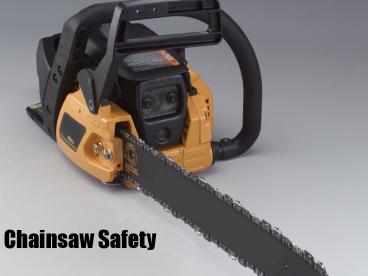Chainsaw Safety - PowerPoint PPT Presentation
1 / 12
Title:
Chainsaw Safety
Description:
Always avoid making cuts with the saw between your legs, always cut with the saw ... Always stand to one side of the limb you are to cut, never straddle it. ... – PowerPoint PPT presentation
Number of Views:1471
Avg rating:3.0/5.0
Title: Chainsaw Safety
1
Chainsaw Safety
2
Chainsaw Safety
- A chain saw is the most dangerous hand tool that
can be purchased on the open market. - It requires no license and no training to own or
operate. - Approximately 40,000 injuries and deaths were
reported last year in the United States
3
Chainsaw Accidents
- More than 36 were injuries to the legs and
knees. - Average chainsaw injury requires 110 stitches
- Average medical cost was 12,000.
- Medical costs for chainsaw injuries 350 million.
- Average four weeks recovery is required
4
Chainsaw Injuries
5
Chainsaw Safety
- Prepare yourself
- Read operators manual
- Obtain training from an experienced chainsaw
operator - Be in top mental and physical condition
- Do not use medications, alcohol, or other
influencing factors
6
Chainsaw Safety Equipment
- Personal Protective Equipment
- Safety Goggles
- Hearing Protection
- Steel-toed Shoes
- Hard hat
- Gloves
- Close fitting clothes
- Saw resistant chaps
7
Chainsaw Equipment
Saw Selection Lightweight Saws 8-12 guide
bar Used for light work, cutting small
branches, and felling 6-8 diameter
trees Midweight Saws 14-20 guide bar Used
for frequent log cutting and felling 12- 18
diameter trees Heavyweight Saws Guide bar more
20 Professional use only
8
Chainsaw Equipment
- Preventative maintenance pays off in safety and
productivity - Properly sharpened teeth cut quickly and
smoothly, resulting in a safer cut - Good sparkplug, clean air filter, and a good
muffler make a better running engine, making
your work easier and safer - Proper chain tension helps ensure long chain
life and safer cutting - Too tight-binds, excessive wear Too
loose-derail and whip around dangerously
9
Chainsaw Equipment
Starting Techniques Start chain saw engine by
setting saw on firm ground with chain out of gear
and free of obstacles, placing right foot in loop
of rear handle, pressing left hand down on upper
handle and pulling starter rope straight up with
right hand.
10
Chainsaw Safety Tips
Kickback of a chainsaw is when the teeth on the
chain catch on something as they rotate around
the tip of the blade. The teeth may have enough
force to cause the blade to kick back violently
toward you, hence the term "kickback."
- Three Situations that cause KICKBACK
- When the nose of the blade strikes another
object. - Starting a bore cut improperly.
- When the blade nose or tip catches the bottom or
side of a saw cut during reinsertion.
11
Kickback Defense
- The best defense against kickback is to keep the
tip guard on the chain saw. This does limit what
you can do with the tool. - Some kickback control can be maintained by
keeping a firm hold on the saw and using a saw
which has a chain-brake or kickback guard. - Always be watchful for blade-pinching situations
and plan accordingly. - Cut branches at the base of the blade, don't saw
with the tip of the blade. - Use a high chain speed when reinserting the blade
in a cut or removing it from a cut. - Keep the saw teeth sharp so they will cut dull
teeth are more likely to cause a kickback. - Always cut below shoulder height, otherwise the
saw is difficult to control and is too close to
your face.
12
Chainsaw Safety Tips
- Always avoid making cuts with the saw between
your legs, always cut with the saw to the outside
of your legs. - Don't stand on a log and saw between your feet.
- Always stand to one side of the limb you are to
cut, never straddle it. - Always keep in mind where the chain will go if it
breaks, never position yourself or other people
in line with the chain. - Keep the chain out of the dirt, debris will fly,
the teeth will be dulled and the chain life
shortened considerably. - Always know where the tree will fall

